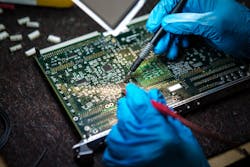Texas Instruments, hammered by excess supply of analog semiconductors and the uncertainty surrounding the trade war between the United States and China, said that its business could be close to bottoming out. The company's sales declines abated in the fourth quarter of 2019, signaling that the worst of the semiconductor slump may be behind it.
Late last month, Texas Instruments reported revenues of $3.35 billion for the fourth quarter, slightly ahead of its forecast of $3.07 billion to $3.33 billion. The company's rate of year-over-year sales decline eased from 11% in the third quarter to 10% in the fourth quarter. Texas Instruments said sales would come out to about $3.25 billion in the first quarter of 2020, slipping 10% from sales of $3.59 billion in the first quarter of 2019.
"While this is only a marginal improvement, all end markets reduced their rate of decline significantly, with the exception of wireless communications equipment, where the year-over-year declines increased about as expected given the strength of this market in the year-ago quarter," Texas Instruments said in a statement last month. "The results throughout the quarter reflected what we believe is best described as demand stabilizing."
Rich Templeton, chief executive officer of Texas Instruments, said in a statement that "most markets showed signs of stabilizing." Profit dipped during the fourth quarter to $1.07 billion, or $1.12 a share, down from $1.24 billion, or $1.27 a share, in the same quarter last year, while profit margins fell more than 2% to 63%. Analog semiconductor sales shriveled by 5% year-over-year, but the rate of decline eased from 8% in the previous quarter.
The company's profit is projected in the range of $0.96 to $1.14 per share for the first three months of 2020, declining from $1.26 per share over the same span in 2019. Texas Instruments said gross margins would decline to 63% in the first quarter of 2020, down from 65.2% in the first quarter of 2019. The company's shares have fluctuated for the last month, slipping 10% late last month before regaining 8% in recent weeks.
The world's leading vendor of analog semiconductors, Texas Instruments has the widest range of chips and the longest list of customers in the segment. It sells tens of thousands of components to more than 100,000 customers in every market that uses electronic devices, serving as a bellwether for the global chip business and a barometer for electronics demand. The company holds the title of the world's seventh largest chip vendor by sales.
Sales of analog and other chips used in cars and factory machinery accounts for nearly 60% of its business. Texas Instruments said that its top 10 products accounted for around 5% of the company's total sales in 2019. The company added that its 100th largest product only accounted for about one tenth of one percent of its business. More than 40% of the products it sold last year have been in production for a decade or more.
Texas Instruments has been struggling to snap out of the doldrums for the last year and a half. The company said customers have been trying to get through surplus inventory over the last year, pushing out orders. Texas Instruments has blamed the uncertainty kindled by the ongoing trade war between the United States and China in for making customers more cautious in recent quarters and slowing its recovery in the process.
But the company signaled an impending rebound in global electronics demand. Texas Instruments reported its fifth straight quarter of year-over-year declines, which is generally as long as it takes the semiconductor industry to get through surplus inventory. The US has also hammered out an initial trade agreement with China—the world's largest importer of US chips—which could ease the uncertainty faced by electronics manufacturers.
Demand for chips used in automobiles, consumers electronics, factory equipment, and other markets continued to fall in the fourth quarter, Texas Instruments said. But the rate of decline abated from roughly 8% to 10% in the September quarter to 3% to 4% in the December quarter, the company said. On the other hand, sales of analog chips used in wireless communications slipped by 50% because of a sudden slowdown in 5G investments.
"We have to be ready for whatever the market throws at us," said Rafael Lizardi, chief financial officer of Texas Instruments, on a conference call with analysts last month. "If this is going to last longer, we need to be ready for that. If things are going to head south, we also have got to be ready. But if things turn around, we are going to start seeing year-on-year growth again. Our business model allows us to do that and we're well positioned."
About the Author
James Morra
Senior Editor
James Morra is the senior editor for Electronic Design, covering the semiconductor industry and new technology trends, with a focus on power electronics and power management. He also reports on the business behind electrical engineering, including the electronics supply chain. He joined Electronic Design in 2015 and is based in Chicago, Illinois.

